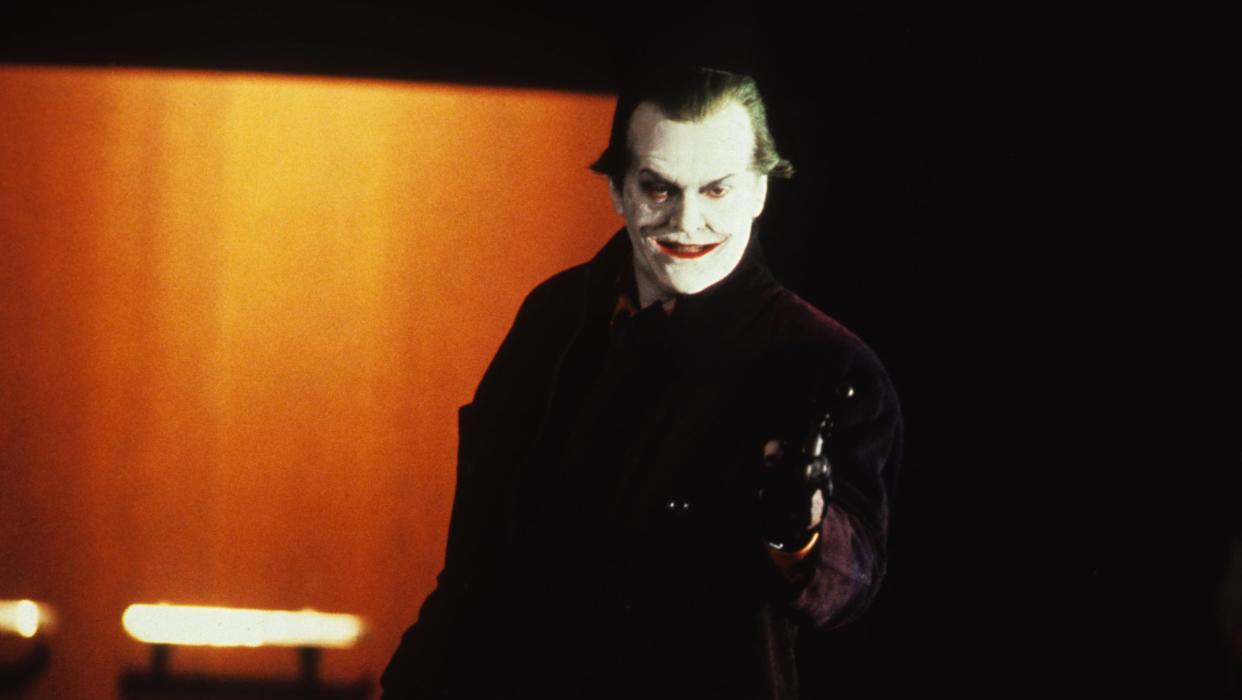Peter Bart: How Jack Nicholson’s Batman Freak-Out Helped Build The Mythology Behind ‘Joker’

Click here to read the full article.
No one who was on the set will ever forget the day the Joker freaked out. With his face frozen in grotesque makeup, he suddenly started screaming that his deal was fraudulent, his director was unprepared, his dialogue was stilted and he was quitting the doomed show. He kept shouting expletives for over two hours to anyone who would listen, then marched off the set.
Observers agreed the movie never would be completed. Except the Joker, in this instance, was Jack Nicholson — who, while quirky and volatile, also was the consummate pro. Batman, circa 1989, not only was completed (Nicholson’s performance became even more fervid) but ultimately established itself as a billion-dollar franchise. And Nicholson’s deal, already generous, was re-negotiated to create an ultimate payoff of roughly $50 million, including participations in Batman profits and merchandising.
More from Deadline
The Joker, Then And Now: The Last-Laugh History Of A Hollywood Wild Card
Can Clint Eastwood Save The Oscars? With Luck And A Little Help, Absolutely
'Joker' Rakes In $9.7M, Best Monday Ever In October, Cume Stands Near $106M
The Joker of the moment is, of course, Joaquin Phoenix, a fine actor whose payday will not approach Nicholson’s despite the fact that his movie is a worldwide box office hit, albeit a perplexing one. While Joker is selling tickets (a $248 million worldwide opening weekend), it’s also producing an extraordinary 24% gap in polls measuring reviewer-vs- audience response (filmgoers liked, critics disdained).
One theory about its success: While Phoenix is superb, Nicholson’s legendary portrayal combined with the Batman mythology helped ignite an appetite for the latest movie (a surprise award at the Venice Film Festival also helped). To some critics, as to some ticket buyers, it seems difficult to see the Joker without conjuring the ghost of Nicholson. (For the record, there have been at least seven other Jokers, ranging from Jared Leto to Zach Galifianakis).
Although all but invisible in today’s Hollywood, Nicholson’s 60-year career has come to define stardom: great roles, myriad Oscar nominations, extravagant payoffs. But will he ever act again? Will he even show up at every Laker game? Are his cognitive skills still orderly? The questions seem all the more relevant at a moment when the creative paths of movie stars in general are increasingly problematic. Most top stars seem to have surrendered their zeal for choosing memorable roles – a talent at which Nicholson excelled.
Glance through a list of the year’s top-grossing films and you find that the real “stars” of these hits are not actors but franchises – the Lion King, the Avengers, etc. The year’s only hit built on star names was Once Upon a Time in Hollywood; paradoxically, Leonardo DiCaprio and Brad Pitt play parodies of superstars, both suffering from an absence of self-esteem.
Stars even seem to have lost their stellar importance to their talent agencies, with entities like Endeavor pinning their growth not on Hollywood but on other sectors, planning future IPOs to fuel diversification. Their agents accordingly pin their futures on stock options, not percentages of talent deals (Endeavor’s IPO has been stalled for the time being).
For Nicholson, his career was all about “the show” rather than “the business” (indeed he never signed with a major agency). From his early performances in Easy Rider (1969), Chinatown (1974) and One Flew Over the Cuckoo’s Nest (1975), Nicholson characters were memorably, even outrageously, theatrical; he may not have played a character as subtly understated as Pitt’s in Ad Astra.
Famously picky about his roles, Nicholson would sacrifice a big payday to accept films like Terms of Endearment or to work with a range of directors such as Stanley Kubrick, Mike Nichols, John Huston and James L. Brooks. One of his gambles was to join forces with an upcoming filmmaker named Warren Beatty on the courageous but under-budgeted drama, Reds, in 1981.
Citing Nicholson’s range of portrayals from Five Easy Pieces to The Witches of Eastwick to Carnal Knowledge, Robin Williams famously proclaimed, “There’s Jack Nicholson – and then there’s everyone else.”
While dedicated and professional as an actor – his Batman freak-out was an exception – Nicholson in person was a stalwart eccentric. A dedicated art collector and zealous reader, he nonetheless preferred to confine his conversation to basketball or to women. A committed loner at age 82, he also can be a charmer socially. He was well into his 30s before he came to terms with his equally eccentric personal history: The woman he thought was his sister was actually his mother, while his presumed mother was in fact his grandmother.
Nicholson and Brad Grey eight years ago urged me to fly with them to Brown University, where Jennifer Nicholson and Max Grey were undergraduates. “I’d like to try to explain to these kids what I do for a living,” Nicholson told me on the plane. “So talk to me about movies and Hollywood, and I will try to sound intelligent onstage.”
The surprised audience at Brown greeted Nicholson as an icon. After tumultuous applause, he delivered some astute if rambling remarks about acting and filmmaking and even managed to weave in “the vital role of ‘good weed’ in attacking one’s work” – especially when creating a character like the Joker.
He didn’t try to make lot of sense, but then he didn’t need to. He was, as Robin Williams said, Jack Nicholson, whose legendary portrayals live on.
Sign up for Deadline's Newsletter. For the latest news, follow us on Facebook, Twitter, and Instagram.

